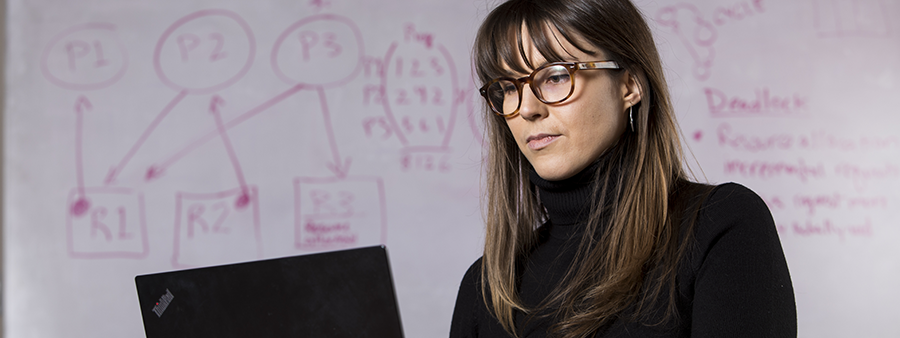MS and Fifth-Year Master's Degree Program

Master's degrees require a minimum of 30 credits and the fulfillment of at least 10 courses with grades of S (satisfactory) or at least a B-. Program requirements may vary.
Fifth-Year Master's Degree Program
The School of Engineering offers exceptional Tufts undergraduate students the option of pursuing a combined Bachelor of Science and Master of Science degree (BS/MS) as a thesis or non-thesis program. School of Engineering students who matriculate into the MS program after February 1, 2023, may reserve two graduate-level courses towards their MS degree and double-count two courses towards both the BS and MS degrees, for a total of four courses. Students must complete their BS requirements before matriculating into the MS program. The degrees cannot be completed concurrently. Only 100-level courses are eligible. Learn more.
MS in Computer Science
Students in the MS degree program in Computer Science can choose to complete a master’s thesis or a project-based study track. The MS program can be completed in one year, or two years with an optional thesis. In this program, students can pursue interdisciplinary collaborations within Tufts School of Engineering and across the university.
Thirty credits are required, of which at least 24 credits must be from approved courses. The remaining six credits may be earned from approved courses, or from conducting approved research or independent study, or from a combination of the two.
MS in Data Science
The Master of Science in Data Science (MSDS), administered jointly by the Departments of Computer Science and Electrical and Computer Engineering, prepares students for future careers and/or further study in Data Science. The MSDS is a one-year program that may be completed either in 9 or 12 months of study.
MS in Computer Engineering
The MS program in Computer Engineering is jointly administered between the Department of Computer Science and the Department of Electrical and Computer Engineering..
Master's degrees require a minimum of 30 credits and the fulfillment of at least 10 courses with grades of S (satisfactory) or at least a B-. All courses must be at the 100 level or above; grades in all courses must be B- or better. At least four lecture-based courses must be taken from a published list of computer engineering core courses.
MS in Cybersecurity and Public Policy
The MS program in Cybersecurity and Public Policy is a joint program between the Department of Computer Science and The Fletcher School.
Students will fulfill a minimum of 10 courses or 30 credits over the course of 16-24 months, divided between computer science and policy studies.
MS in Human-Robot Interaction
Human-Robot Interaction is an interdisciplinary effort aimed at understanding and improving all aspects of interactions between humans and robots. It draws on knowledge from computer science, mechanical and electrical engineering, as well as psychology, philosophy, anthropology, legal fields, among various others. The Department of Computer Science and the Department of Mechanical Engineering each now offer an MS in Human-Robot Interaction.
The Department of Computer Science offers two MS options to students in HRI: a course-based option and a thesis-based option. All HRI students must take five required core courses, which are non-transferrable and represent five foundational subfields in HRI. Students must also take selected elective courses offered by HRI. Master's degrees require a minimum of 30 credits and the fulfillment of at least 10 courses with grades of S (satisfactory) or at least a B-.
MS in Software Systems Development
The Master of Science in software systems development prepares students for careers in a fast-growing technology market. Students will learn how to design, build, and test systems programs in C and C++ through a set of courses containing practical experience in all aspects of C/C++ software development. Students may choose between completing a master’s thesis or a course-based study track.
MS in Bioengineering (Bioinformatics track)
The Bioengineering (MS) program provides a broad engineering and biotechnology curriculum, while offering a focus on a specific engineering track that best fits students' interests and career choices. This combination gives our bioengineering graduates professional flexibility, a distinct competitive advantage in the ever-changing field of bioengineering. Computer Science is the home department for students studying in the Bioinformatics track. Master's degrees require a minimum of 30 credits and the fulfillment of at least 10 courses with grades of S (satisfactory) or at least a B-.
This track requires some undergraduate computer science as a prerequisite (COMP 15 or the equivalent). Students will work with an advisor to design a coherent program including computer science electives as well as courses in computational biology, math and biotechnology.
Dual Degree Master's Program (with Tufts Gordon Institute)
Develop your innovation, leadership and management skills and build your technical depth with our Dual Degree Master's Program. You’ll earn two degrees: an MS offered by the Department of Computer Science, and an MS Innovation & Management (MSIM). You earn both degrees in an accelerated timeframe and at a reduced cost. Tufts School of Engineering offers a wide range of MS programs and all qualify for the dual degree program. Master's degrees require a minimum of 30 credits and the fulfillment of at least 10 courses with grades of S (satisfactory) or at least a B-.